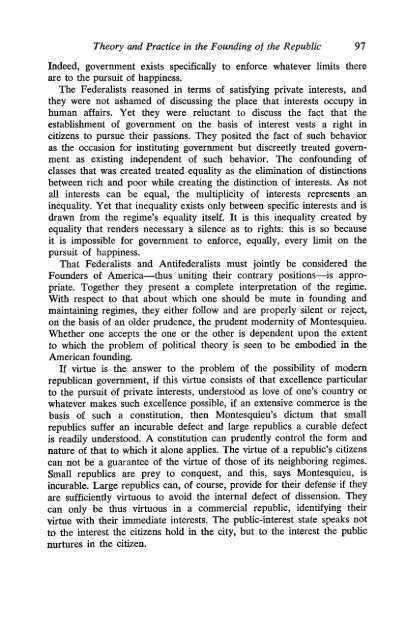philosophy - Interpretation
philosophy - Interpretation
philosophy - Interpretation
Create successful ePaper yourself
Turn your PDF publications into a flip-book with our unique Google optimized e-Paper software.
Theory and Practice in the Founding of the Republic 97<br />
Indeed, government exists specificaUy to enforce whatever limits there<br />
are to the pursuit of happiness.<br />
The Federalists reasoned in terms of satisfying private interests, and<br />
they were not ashamed of discussing the place that interests occupy in<br />
human affairs. Yet they were reluctant to discuss the fact that the<br />
establishment of government on the basis of interest vests a right in<br />
citizens to pursue their passions.<br />
They posited the fact of such behavior<br />
as the occasion for instituting government but discreetly<br />
treated govern<br />
ment as existing independent of such behavior. The confounding of<br />
classes that was created treated equahty<br />
as the elimination of distinctions<br />
between rich and poor wlhle<br />
creating the distinction of interests. As not<br />
all interests can be equal, the multiplicity of interests represents an<br />
between specific interests and is<br />
inequality. Yet that inequality exists only<br />
drawn from the regime's equahty itself. It is this inequality created by<br />
equahty that renders necessary a sUence as to rights: this is so because<br />
it is impossible for government to enforce, equally, every limit on the<br />
pursuit of happiness.<br />
That Federalists and Antifederalists must jointly<br />
Founders of America thus uniting their contrary<br />
priate. Together they<br />
be considered the<br />
positions is appro<br />
present a complete interpretation of the regime.<br />
With respect to that about which one should be mute in founding and<br />
maintaining regimes, they either foUow and are properly silent or reject,<br />
on the basis of an older prudence, the prudent modernity of Montesquieu.<br />
Whether one accepts the one or the other is dependent upon the extent<br />
to which the problem of pohtical<br />
theory<br />
American founding.<br />
is seen to be embodied in the<br />
If virtue is the answer to the problem of the possibUity<br />
of modern<br />
repubhcan government, if this virtue consists of that exceUence particular<br />
to the pursuit of private interests, understood as love of one's country or<br />
whatever makes such exceUence possible, if an extensive commerce is the<br />
basis of such a constitution, then Montesquieu's dictum that small<br />
repubhcs suffer an incurable defect and large republics a curable defect<br />
is readUy<br />
understood. A constitution can prudently<br />
control the form and<br />
nature of that to which it alone applies. The virtue of a republic's citizens<br />
can not be a guarantee of the virtue of those of its neighboring<br />
regimes.<br />
Small repubhcs are prey to conquest, and this, says Montesquieu, is<br />
incurable. Large republics can, of course, provide for their defense if they<br />
are sufficiently virtuous to avoid the internal defect of dissension. They<br />
can only be thus virtuous in a commercial republic, identifying their<br />
virtue with their immediate interests. The public-interest state speaks not<br />
to the interest the citizens hold in the city, but to the interest the pubhc<br />
nurtures in the citizen.
















